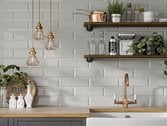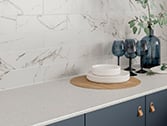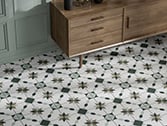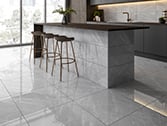How To Choose The Right Tile Grout


"Tile grout is only there to fill the gaps between the tiles and stop the dirt getting in, so any old cheap and cheerful material will do, won’t it?"
Most of you reading this article will be astounded by the above statement which is, of course, the intention. It’s completely untrue and yet many consumers believe this to be the case. Grout doesn’t just fill the "gaps" or joints, as they’re correctly termed, in your floor and wall tiles. It’s an important material that plays a vital role within the entire tiled finish.
First, we will discuss what grout actually is...
What is grout?
Tile grout is a dense fluid which is used for bonding and sealing the joints between tiles. First, grout is used for fixing your wall or floor tiles to the desired surface, then the grout is used to seal the spaces in between the tiles. Once it dries, it'll form a fluid concrete that will effectively keep these tiles in place.
It's important that you choose a waterproof or mould proof tile grout depending on where your tiles will be used, i.e. a bathroom or kitchen.
The uses of grout
Apart from completing an installation, tile grout provides an appealing aesthetic look, capable of making a bold design statement or creating a subtle effect. It also accommodates manufacturing tolerances within tiles, forms a compressible joint to alleviate minor stresses within the installation (not to be confused with movement joints, which are still necessary) and provides a neat transition between adjoining tiles.
Related: Learn how to clean your grout here.
How to choose the right tile grout?
When choosing a grout, it’s important to consider the final use of the tile installation. In heavy-duty floor tile applications, such as shopping malls or leisure complexes, it’s logical to choose a grout which is able to cope with the increased demands placed on the flooring. The tiled finish will be required to withstand increased abrasion and more frequent foot traffic.
How do you test grout performance? BS EN 13888, a standard to test the performance of grouts, categorises cement-based grouts as CG and is a useful tool in the specification. CG2 denotes improved performance and CG2A indicates high abrasion resistance.


For Wet Environments
In wet environments, grout with reduced water absorption is also beneficial and are classified as CG2W. High-performance products offer combined benefits. For example, Mapei Ultracolor Plus is classified as CG2WA, so offers high resistance to abrasion and reduced absorption of water. These features make it ideal for heavy duty and wet duty environments. The product also contains mould inhibitors for added protection in showers and bathrooms, as well as external facades, balconies and terraces.
For Natural Stone
Although many grouts are suitable for use with ceramic tiles, other considerations need to be borne in mind with natural stone. Water used in the preparation of the grout may migrate into the stone through the edges, leaving a ‘picture frame’ effect visible on the surface. The use of a specially formulated rapid setting grout – like Mapei Ultracolor Plus - virtually eliminates the risk of this type of staining.
For Industrial Environments
In industrial environments or areas where hygiene is important, an epoxy resin grout will be required to offer the necessary chemical resistance. For example, Mapei Kerapoxy IEG (which is compliant with EC regulation 852/2004 relating to hygiene and foodstuffs) is resistant to animal fats, oils and grease, so it’s an ideal grouting choice for meat processing plants and commercial kitchens. Mapei epoxy grouts also emit extremely low levels of VOC, being classified EC1PLUS under the GEV EMICODE.
For Decorative Purposes
At the other end of the scale, highly decorative products – like Mapei Kerapoxy Design - can add to a surface aesthetic and dry to a translucent finish that’s particularly effective when used with glass tiles or mosaics. The impervious grouts are available in a spectrum of designer shades and can even be enhanced by the addition of light gold or silver glitter, making a grout joint a design statement in its own right.
Click here to find your local Tile Giant showroom
Or click here to shop the full range of Mapei Grout
Need more help? Call our team of experts on 0330 053 3362
By Colin Stanyard, Ceramic Product Manager, Mapei UK Ltd
Editor’s note:
Founded in 1937, Mapei is the world-leading manufacturer of adhesives and chemical building products - and a specialist in the production of adhesives and preparation products for the installation of wall and floor coverings. Its extensive product range includes products for the preparation of all types of substrates used in construction: surface membranes, levelling compounds, primers, waterproofing, ready mixed mortars, special products for the repair of concrete, admixtures for mortar and concrete, adhesives for floor and wall coverings, ceramic tiles, natural stone, soft flooring and wood, grouts and flexible sealants, mortars and binders for the restoration of period buildings, resin flooring, soundproofing systems, protective finishes for exterior walls and special hydraulic binders for screeds.














